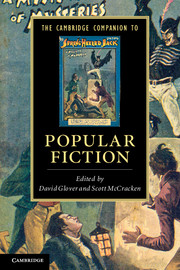Book contents
- Frontmatter
- Introduction
- 1 Publishing, history, genre
- 2 Fiction, theatre and early cinema
- 3 Television and serial fictions
- 4 The public sphere, popular culture and the true meaning of the zombie apocalypse
- 5 The reader of popular fiction
- 6 Reading time: popular fiction and the everyday
- 7 Gender and sexuality in popular fiction
- 8 Pulp sensations
- 9 Bestselling fiction: machinery, economy, excess
- 10 Comic books and graphic novels
- 11 Popular fiction in the digital age
- Further reading
- Index
- Cambridge Companions to …
4 - The public sphere, popular culture and the true meaning of the zombie apocalypse
Published online by Cambridge University Press: 28 May 2012
- Frontmatter
- Introduction
- 1 Publishing, history, genre
- 2 Fiction, theatre and early cinema
- 3 Television and serial fictions
- 4 The public sphere, popular culture and the true meaning of the zombie apocalypse
- 5 The reader of popular fiction
- 6 Reading time: popular fiction and the everyday
- 7 Gender and sexuality in popular fiction
- 8 Pulp sensations
- 9 Bestselling fiction: machinery, economy, excess
- 10 Comic books and graphic novels
- 11 Popular fiction in the digital age
- Further reading
- Index
- Cambridge Companions to …
Summary
One of the standard denigrations of popular culture since the rise of its mass, industrial forms in the nineteenth century is that it debases appropriate public representations and discourse. Where we might hope for discernment, popular culture offers uncritical gorging and passive absorption. Where we might have had ambitions for informed and critical public opinion, we get instead sensation and emotional excess. The popular is something that cheapens public discourse, which mesmerises its mass audience with spectacle and threatens, as one panicked critic put it in the 1950s, ‘to engulf everything with its spreading ooze’, like something out of The Blob. This disdain is shared across the political spectrum. In the immediate post-1945 era, cultural conservatives like Evelyn Waugh saw an aristocratic cultural heritage being sacrificed for bloodless meritocracy, the world made safe ‘for the travelling salesman, with his polygonal pince-nez, his fat wet hand-shake, his grinning dentures’. A liberal like Richard Hoggart, founding professor of Birmingham's Centre for Contemporary Cultural Studies, worried that authentic traditions of English proletarian culture were being destroyed by American mass culture, ‘a myth-world compounded of a few simple elements’ that had been garnered from ‘crime, science fiction and sex novelettes’. On the left, the pessimism of the Marxists Theodor Adorno and Max Horkheimer led them to denounce the ‘culture industry’, as they witnessed it in exile in the 1940s in America, as a destruction of the critical capacities of serious art and its replacement by the mechanical repetition and indoctrinations of capitalist mass entertainment. Popular culture everywhere destroys any chance of a proper public culture.
- Type
- Chapter
- Information
- The Cambridge Companion to Popular Fiction , pp. 68 - 85Publisher: Cambridge University PressPrint publication year: 2012
- 3
- Cited by



